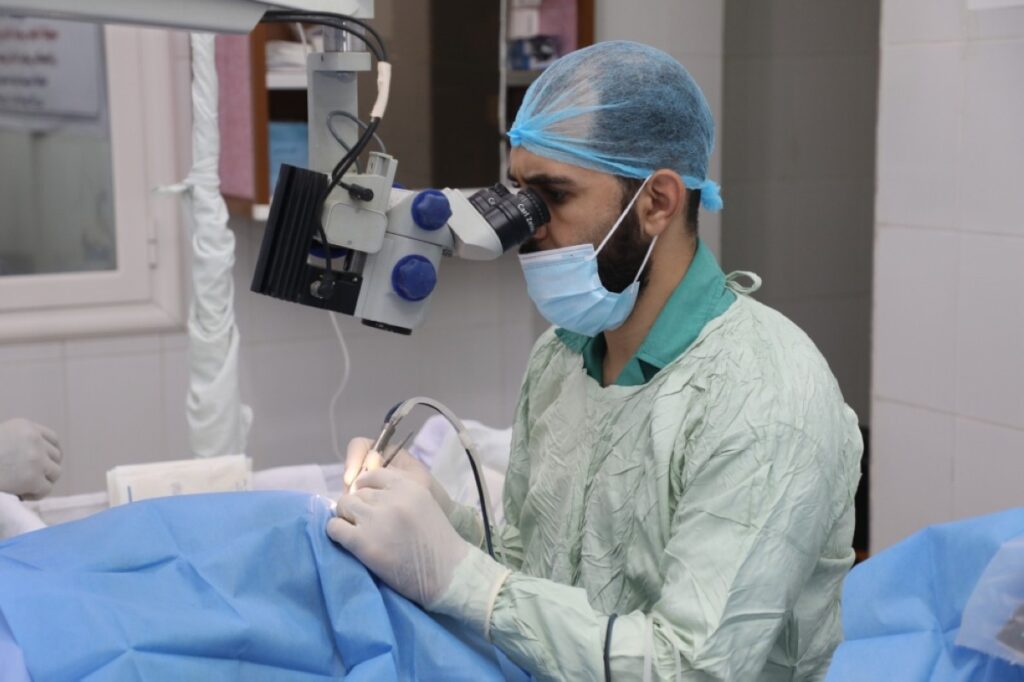KUWAIT: As blindness rates in Sudan soar from 10 to 30 percent in recent months, Kuwaiti humanitarian initiatives have emerged as a vital source of relief for thousands of patients whose suffering has deepened amid the ongoing conflict. Medical data indicate that cataracts remain the most prevalent and treatable cause of vision loss in Sudan, provided that resources and infrastructure are available. Alongside cataracts, trachoma – a bacterial infection linked to poverty and poor sanitation – continues to contribute to preventable blindness, though it has been eradicated in many countries through public health campaigns. Glaucoma, a leading cause of irreversible blindness, is also widespread due to weak health awareness and the absence of early detection programs.
Dr Mohammed Ali Hajo, Director of Programs and Partnerships at the Kuwait Patients Helping Fund Society, told the Kuwait News Agency (KUNA) that recent field surveys revealed a sharp rise in blindness cases caused by the suspension of cataract surgeries, the lack of preventive services and severe shortages of essential medications. “These figures represent thousands of cases that could have been saved if medical resources were available,” he said, noting that the Fund has conducted over 1,000 cataract operations across four governorates, though the need remains overwhelming.
Hajo added that war-related injuries have exacerbated the crisis, as many patients have been deprived of urgent care that could preserve their sight. He described Sudan’s ophthalmology sector as “almost paralyzed” for over a year due to the interruption of supplies, lack of medical equipment and the emigration of specialized staff. He urged urgent support for medications, training, and awareness campaigns to contain the spread of cataracts and glaucoma.
Dr Amir Abu Qurun, Director of Mecca Hospital in Omdurman and representative of the Al-Basar Charitable Foundation in Khartoum State, emphasized to KUNA that international, regional and local cooperation is essential to sustain blindness prevention efforts. He praised the ongoing support of the Kuwait Direct Aid Society and the Saudi King Salman Humanitarian Aid and Relief Center, which continue to sponsor free medical camps, training programs, and treatment initiatives despite the war.
“The continuation of this support makes the difference between blindness and sight for thousands of patients,” Abu Qurun said, calling for the expansion of sponsorship programs to fund free surgeries and field clinics. He revealed that blindness rates in Sudan have doubled in the past two years, reaching 30 percent, mainly due to the disruption of healthcare services, the displacement of populations, and the loss of medical personnel and supplies.
Abu Qurun explained that cataracts account for roughly 70 percent of blindness cases in Sudan, followed by retinal diseases – often associated with diabetes – and glaucoma. Since its founding in 1993, the Makkah Foundation for Optics has treated more than 1.8 million patients, representing 65 percent of Sudan’s national efforts to combat blindness. The foundation operates hospitals and field clinics that conduct up to 80 surgeries daily and treat over 4,000 patients weekly.
He highlighted that the war has had a catastrophic effect on the health system, destroying around 60 percent of medical assets due to looting and damage. Five of the foundation’s ten hospitals, including the Khartoum Referral Center, have shut down. However, the staff successfully reopened Omdurman Hospital in September 2024 after rehabilitation efforts, serving 89,000 patients – including 10,000 surgeries and 28,000 diagnostic examinations.
Meanwhile, Dr Atef Omar, Director of the National Ophthalmology Program at Sudan’s Ministry of Health, told KUNA that field estimates confirm an increase in blindness cases, despite the lack of precise data. “The situation is dire, but the ophthalmology infrastructure remains capable of recovery if the necessary support is provided,” he said.
Omar explained that the Ministry has launched an emergency plan to secure essential medicines and supplies while cooperating with charitable foundations, including Al-Basar, to maintain services without undermining government hospitals. He confirmed that cataracts and glaucoma remain the leading causes of blindness, while injury-related cases have grown increasingly complex.
Agricultural cooperation
In a related development, Kuwait’s Acting Director-General of the Public Authority for Agricultural Affairs and Fish Resources, Salem Al-Hai, met on Sunday with Sudan’s Minister of Animal and Fisheries Resources, Ahmed El-Tijani, to discuss strengthening cooperation in food security and natural resource development. According to a statement issued by the Authority, the meeting was attended by the Head of the Regional Office of the Arab Organization for Agricultural Development (AOAD), Drar Al-Mustafa, and Sudan’s Ambassador to Kuwait, Awad Karim Balla. Both sides praised AOAD’s efforts, headquartered in Sudan, in fostering Arab agricultural cooperation and promoting mutual investment.
Al-Hai reaffirmed the strong relations between Kuwait and Sudan and underscored Kuwait’s commitment to expanding agricultural collaboration and knowledge exchange with Arab nations. For his part, Minister El-Tijani highlighted promising investment opportunities in Sudan’s agricultural sector, emphasizing the importance of continued cooperation. AOAD aims to enhance agricultural integration among Arab countries by improving productivity, optimizing fishery resources and supporting food security initiatives across the region. — KUNA

